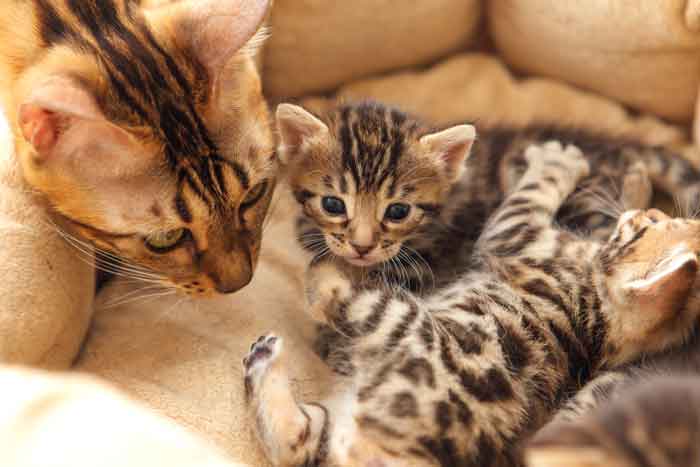Bengals are solitary by nature, so if you bring a Bengal into your home, it’s important to socialize them. If you start socialization early, most cats will learn to live with you and the other people or animals in your home. A cat socialized with care and sensitivity will become a confident and friendly animal at ease in social situations. The earlier socialization begins, the better. A cat’s social education should start while they’re still a kitten. It’s more challenging to re-educate an older cat.
Introduce your kitten to new experiences one at a time. When your kitten meets new people, other cats, dogs, or the vet, make the experience a rewarding one. Keep first meetings short and sweet. It’s a good idea to offer your kitten a treat if they behave well. Get your kitten used to being handled as soon as possible. Providing a range of cat-friendly toys and a scratching post are good ways to encourage a new cat to explore and gain confidence. Talk to your kitten, play with them often, and they will soon adapt.
If you must bring an older cat into your home, prepare to exercise greater patience. Mature cats may find changes to their environment and routines unsettling at first. Find out what your new cat was used to in their old home. If they had a favorite bed or toy, ask if you may keep them to help your new cat feel at home. A cat carrier or cardboard box furnished with a cushion, or a blanket can offer a safe refuge to a nervous cat.
While engaging kittens in physical play is easy, an older cat may dislike being touched at first. They may also dislike strangers and other animals. Allow an older cat plenty of time to explore their new surroundings before introducing them to others. An effective way to socialize an older cat whose behavior may not suit you is to use a system of “reward or refusal.” When your cat behaves well, offer them a treat, and talk to them in a happy tone of voice. Never punish a cat.
They will not understand why you are being unkind. If their behavior is unacceptable, such as scratching or biting, refuse to continue the interaction. You can emphasize your displeasure by saying “no” in a firm tone of voice. Never pressure an older cat into contact with new people. You should not place them on someone else’s lap, for example. Always allow an older cat to approach others when they feel ready to do so.
When socializing a new cat, whether a kitten or a mature animal, the keys to success are awareness of the animal’s needs, taking things one step at a time, and reinforcing good behavior. With consideration and patience, your new cat will grow in confidence and become well socialized. Cats make wonderful household pets and, once socialized, will bring you many hours of pleasure.

